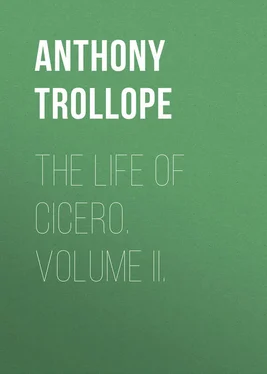Anthony Trollope - The Life of Cicero. Volume II.
Здесь есть возможность читать онлайн «Anthony Trollope - The Life of Cicero. Volume II.» — ознакомительный отрывок электронной книги совершенно бесплатно, а после прочтения отрывка купить полную версию. В некоторых случаях можно слушать аудио, скачать через торрент в формате fb2 и присутствует краткое содержание. ISBN: , Жанр: foreign_prose, на английском языке. Описание произведения, (предисловие) а так же отзывы посетителей доступны на портале библиотеки ЛибКат.
- Название:The Life of Cicero. Volume II.
- Автор:
- Жанр:
- Год:неизвестен
- ISBN:http://www.gutenberg.org/ebooks/28676
- Рейтинг книги:3 / 5. Голосов: 1
-
Избранное:Добавить в избранное
- Отзывы:
-
Ваша оценка:
- 60
- 1
- 2
- 3
- 4
- 5
The Life of Cicero. Volume II.: краткое содержание, описание и аннотация
Предлагаем к чтению аннотацию, описание, краткое содержание или предисловие (зависит от того, что написал сам автор книги «The Life of Cicero. Volume II.»). Если вы не нашли необходимую информацию о книге — напишите в комментариях, мы постараемся отыскать её.
The Life of Cicero. Volume II. — читать онлайн ознакомительный отрывок
Ниже представлен текст книги, разбитый по страницам. Система сохранения места последней прочитанной страницы, позволяет с удобством читать онлайн бесплатно книгу «The Life of Cicero. Volume II.», без необходимости каждый раз заново искать на чём Вы остановились. Поставьте закладку, и сможете в любой момент перейти на страницу, на которой закончили чтение.
Интервал:
Закладка:
The games in Pompey's theatre, to the preparation of which Cicero alludes in his speech against Piso, are described by him with his usual vivacity and humor in a letter written immediately after them to his friend Marius. Pompey's games, with which he celebrated his second Consulship, seem to have been divided between the magnificent theatre which he had just built – fragments of which still remain to us – and the "circus maximus." This letter from Cicero is very interesting, as showing the estimation in which these games were held, or were supposed to be held, by a Roman man of letters, and as giving us some description of what was done on the occasion. Marius had not come to Rome to see them, and Cicero writes as though his friend had despised them. Cicero himself, having been in Rome, had of course witnessed them. To have been in Rome and not to have seen them would have been quite out of the question. Not to come to Rome from a distance was an eccentricity. He congratulated Marius for not having come, whether it was that he was ill, or that the whole thing was too despicable: "You in the early morning have been looking out upon your view over the bay while we have been staring at puppets half asleep. Most costly games, but I should say – judging of you by myself – that they would have been quite revolting to you. Poor Æsopus was there acting, but so unfitted by age that all his friends could not but wish that he had desisted. Why should I tell you of it all? The very costliness of the affair took away all the pleasure. Six hundred mules on the stage in the acting of Clytemnestra, or three thousand golden goblets in The Trojan Horse – what delight could they give you? If your slave Protogenes was reading to you something – so that it were not one of my speeches – you were better off at any rate than we. There were two marvellous slaughterings of beasts which lasted for five days. Nobody denies but that they were very grand. But what pleasure can there be to a man of letters 33 33 "Quæ potest homini esse polito delectatio," Ad Div., vii., 1. These words have in subsequent years been employed as an argument against all out-of-door sports, with disregard of the fact that they were used by Cicero as to an amusement in which the spectators were merely looking on, taking no active part in deeds either of danger or of skill. — Fortnightly Review , October, 1869, The Morality of Field Sports.
when some weak human creature is destroyed by a sturdy beast, or when some lonely animal is pierced through by a hunting-spear. The last day was the day of elephants, in which there could be no delight except to the vulgar crowd. You could not but pity them, feeling that the poor brutes had something in common with humanity." In these combats were killed twenty elephants and two hundred lions. The bad taste and systematical corruption of Rome had reached its acme when this theatre was opened and these games displayed by Pompey.
He tells Atticus, 34 34 Ad Att., lib. iv., 16.
in a letter written about this time, that he is obliged to write to him by the hand of a secretary; from which we gather that such had not been, at any rate, his practice. He is every day in the Forum, making speeches; and he had already composed the dialogues De Oratore, and had sent them to Lentulus. Though he was no longer in office, his time seems to have been as fully occupied as when he was Prætor or Consul.
We have records of at least a dozen speeches, made b. c. 55 and b. c. 54, between that against Piso and the next that is extant, which was delivered in defence of Plancius. He defended Cispius, but Cispius was convicted. He defended Caninius Gallus, of whom we may presume that he was condemned and exiled, because Cicero found him at Athens on his way to Cilicia, Athens being the place to which exiled Roman oligarchs generally betook themselves. 35 35 Ad Div., ii., 8.
In this letter to his young friend Cælius he speaks of the pleasure he had in meeting with Caninius at Athens; but in the letter to Marius which I have quoted he complains of the necessity which has befallen him of defending the man. The heat of the summer of this year he passed in the country, but on his return to the city in November he found Crassus defending his old enemy Gabinius. Gabinius had crept back from his province into the city, and had been received with universal scorn and a shower of accusations. Cicero at first neither accused nor defended him, but, having been called on as a witness, seems to have been unable to refrain from something of the severity with which he had treated Piso. There was at any rate a passage of arms in which Gabinius called him a banished criminal. 36 36 See the letter, Ad Quin. Frat., lib. iii., 2: "Homo undique actus, et quam a me maxime vulneraretur, non tulit, et me trementi voce exulem appellavit." The whole scene is described.
The Senate then rose as one body to do honor to their late exile. He was, however, afterward driven by the expostulations of Pompey to defend the man. At his first trial Gabinius was acquitted, but was convicted and banished when Cicero defended him. Cicero suffered very greatly in the constraint thus put upon him by Pompey, and refused Pompey till Cæsar's request was added. We can imagine that nothing was more bitter to him than the obligation thus forced upon him. We have nothing of the speech left, but can hardly believe that it was eloquent. From this, however, there rose a reconciliation between Crassus and Cicero, both Cæsar and Pompey having found it to their interest to interfere. As a result of this, early in the next year Cicero defended Crassus in the Senate, when an attempt was made to rob the late Consul of his coveted mission to Syria. Of what he did in this respect he boasts in a letter to Crassus, 37 37 Ad Fam., v., 8.
which, regarded from our point of view, would no doubt be looked upon as base. He despised Crassus, and here takes credit for all the fine things he had said of him; but we have no right to think that Cicero could have been altogether unlike a Roman. He speaks also in the Senate on behalf of the people of Tenedos, who had brought their immunities and privileges into question by some supposed want of faith. All we know of this speech is that it was spoken in vain. He pleaded against an Asiatic king, Antiochus of Comagene, who was befriended by Pompey, but Cicero seems to have laughed him out of some of his petty possessions. 38 38 Ad Quin. Frat., ii., 12.
He spoke for the inhabitants of Reate on some question of water-privilege against the Interamnates. Interamna we now know as Terne, where a modern Pope made a lovely water-fall, and at the same time rectified the water-privileges of the surrounding district. Cicero went down to its pleasant Tempe, as he calls it, and stayed there awhile with one Axius. 39 39 Ad Att., iv., 15.
He returned thence to Rome to undertake some case for Fonteius, and attended the games which Milo was giving, Milo having been elected Ædile. Here we have a morsel of dramatic criticism on Antiphon the actor and Arbuscula the actress, which reminds one of Pepys. Then he defended Messius, then Drusus, then Scaurus. He mentions all these cases in the same letter, but so slightly that we cannot trouble ourselves with their details. We only feel that he was kept as busy as a London barrister in full practice. He also defended Vatinius – that Vatinius with whose iniquities he had been so indignant at the trial of Sextius. He defended him twice at the instigation of Cæsar; and he does not seem to have suffered in doing so, as he had certainly done when called upon to stand up and plead for his late consular enemy, Gabinius. Valerius Maximus, a dull author, often quoted but seldom read, whose task it was to give instances of all the virtues and vices produced by mankind, refers to these pleadings for Gabinius and Vatinius as instances of an almost divine forgiveness of injury. 40 40 Val. Max., lib. iv., ca. ii., 4.
I think we must seek for the good, if good is to be discovered in the proceeding, in the presumed strength which might be added to the Republic by friendly relations between himself and Cæsar.
Интервал:
Закладка:
Похожие книги на «The Life of Cicero. Volume II.»
Представляем Вашему вниманию похожие книги на «The Life of Cicero. Volume II.» списком для выбора. Мы отобрали схожую по названию и смыслу литературу в надежде предоставить читателям больше вариантов отыскать новые, интересные, ещё непрочитанные произведения.
Обсуждение, отзывы о книге «The Life of Cicero. Volume II.» и просто собственные мнения читателей. Оставьте ваши комментарии, напишите, что Вы думаете о произведении, его смысле или главных героях. Укажите что конкретно понравилось, а что нет, и почему Вы так считаете.












